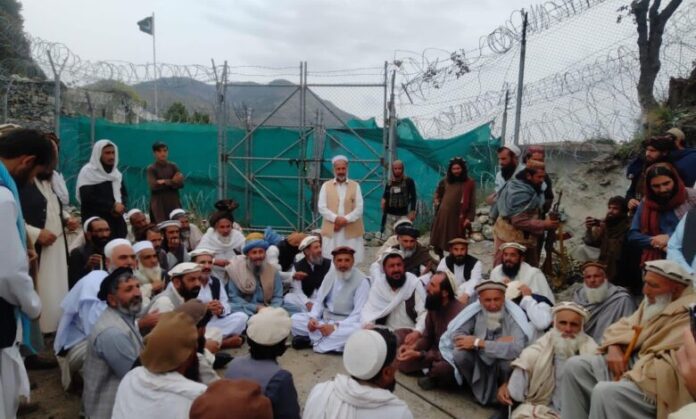
Muhammad Bilal Yasir
Due to the closure of trade corridors with Afghanistan, the people of Bajaur district are grappling with economic difficulties.
Sheikh Jahanzada, a member of the central working committee of the Awami National Party and a participant in the jirga organized for the opening of trade corridors from Bajaur, expressed his optimism that this issue will be resolved soon. He mentioned that over six jirgas have been conducted, with tribal leaders and government officials from both sides participating. The objective is to open these trade corridors to the public.
Regarding recent progress, Commissioner Malakand Division Shahidullah Khan visited the Nawapas border during his tour of Bajaur last week. He was briefed on the situation and expressed satisfaction, assuring the stakeholders that the borders will be opened soon.
The acquisition of trade and livelihood opportunities is a necessity for the people, particularly in the merged districts of the province. The residents of Bajaur district are hopeful that employment opportunities will be generated at the local level. However, the new districts face various social problems resulting from past policies.
Also Read: Explosive Device Kills Two Sisters in South Waziristan
One of the major challenges is the alarming increase in poverty and unemployment rates, which has raised concerns about the merger process. Some individuals feel that despite joining the national mainstream, they are being treated as second-class citizens.
The residents of these newly merged districts have historically been engaged in bilateral trade with Afghanistan, which served as a significant source of livelihood. However, with the closure of the trade corridors, they are now facing considerable difficulties. The Nawapass, which connects Bajaur district with Afghanistan’s Kunar province, has been closed since 2008. This closure has severely impacted cross-border trade and people-to-people interactions.
Pakistan and Afghanistan have a long-standing trade partnership. Afghanistan conducts trade with foreign countries through Pakistani ports, while Pakistan accesses Central Asian countries through Afghanistan. Notable trade corridors on the Pak-Afghan border, such as Ghakhi Pass, Nawapas, Kagah Pass, and Latai Pass in Bajaur, facilitate trade from South Asia to Central Asia.
Unfortunately, due to the infiltration of militants from Afghanistan during the War on Terror, these corridors, including Ghakhi Pass, Nawapas, Latai Pass, and Kagah Pass, have been closed. Traders are eager for the reopening of the old border routes, enabling them to resume business activities with Afghanistan and facilitating economic sustenance for both sides.
Previously bustling with hotels, restaurants, and small businesses, the border areas now experience a haunting silence. Haji Faqir Gul, a former shopkeeper at the Gakhi Pass on the Pak-Afghan border, reminisces about the prosperous old days and wishes for their return. He recalls when numerous people worked in the area, but the onset of the war on terror in 2006 led to the closure of borders due to increased militancy. Like many other small businessmen, Faqir Gul had to shut down his hotel and seek alternative employment, which significantly impacted their livelihoods.
Bajaur and Mohmand districts serve as the preferred route for Afghanistan’s eastern province of Kunar, hosting numerous businesses along the way. It is estimated that more than 20,000 individuals lost their jobs when the borders were closed. The affected individuals are now urging authorities to review the border closures, as they yearn for economic opportunities and the chance to earn a living.
Traders on the Afghan side of the border share similar hopes. Haji Dilbar Mamoond, a trader involved in transporting goods from Afghanistan, stated that the trade route’s closure has rendered hundreds of drivers, helpers, and laborers unemployed. It has also led to food shortages in the border areas.
Similarly, Haji Nawroz, the president of the traders’ union in the Kunar province, mentioned that several attempts have been made to resume business with Pakistan. However, neither the Afghan government nor the Pakistani government has shown a keen interest in continuing this trade.
The local leaders and business community in Bajaur have been actively striving for the reopening of the borders. They have conducted meetings and engaged in discussions with Afghan officials after the local jirgas held in Nawapas under the supervision of the district administration. These efforts aim to facilitate dialogue and find solutions that will benefit both sides economically.
The closure of trade corridors has taken a toll on the livelihoods of countless individuals in Bajaur and beyond. The people anxiously await the reopening of these routes to revive cross-border trade, create employment opportunities, and alleviate the economic hardships faced by the residents.
It is hoped that the governments of Pakistan and Afghanistan will recognize the importance of these trade corridors and work collaboratively to address the challenges and expedite the reopening process, fostering economic growth and stability in the region.

